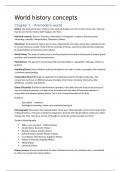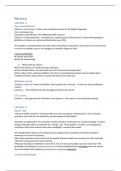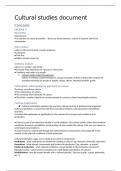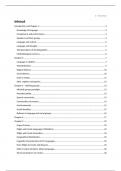Emmaslootmaker
Op deze pagina vind je alle documenten, voordeelbundels en oefenvragen die worden aangeboden door verkoper emmaslootmaker.
- 5
- 0
- 0
Community
- Volgers
- Volgend
5 items

Summary of the concepts - World History
A summary of all the concepts mentioned in this course. It also includes the primary sources of the Things That Talk website.
- Samenvatting
- • 12 pagina's •
A summary of all the concepts mentioned in this course. It also includes the primary sources of the Things That Talk website.

Persons - Cultural Studies
Notes of all the persons who were mentioned in the course, and a description of what their ideas were.
- Samenvatting
- • 10 pagina's •
Notes of all the persons who were mentioned in the course, and a description of what their ideas were.

Concepts and definitions - Cultural Studies
Concepts and definitions of the Cultural Studies. Based on the lecture slides.
- Samenvatting
- • 19 pagina's •
Concepts and definitions of the Cultural Studies. Based on the lecture slides.


Summary - Sociolinguistics
Notes and as a summary for the course Sociolinguistics.
- Boek
- Samenvatting
- • 31 pagina's •
Notes and as a summary for the course Sociolinguistics.

Summary - Cultural Studies
Concepts and persons described. , , Ideology, Hegemony, Globalization, Language, Parole, Semiotics, Structuralism, Signifier, Signified, Cultural codes, Denotation, Connotation, Poststructuralism, Discourse, Archeology, Genealogy, Television, News, The manipulative model, The pluralist model, The hegemonic model, The dominant-hegemonic encoding/decoding, Negotiated code, An oppositional code, Active audience paradigm, Youth, Subculture, Homologies, Bricolage, Subjectivity, Identity, Essentialism...
- Samenvatting
- • 29 pagina's •
Concepts and persons described. , , Ideology, Hegemony, Globalization, Language, Parole, Semiotics, Structuralism, Signifier, Signified, Cultural codes, Denotation, Connotation, Poststructuralism, Discourse, Archeology, Genealogy, Television, News, The manipulative model, The pluralist model, The hegemonic model, The dominant-hegemonic encoding/decoding, Negotiated code, An oppositional code, Active audience paradigm, Youth, Subculture, Homologies, Bricolage, Subjectivity, Identity, Essentialism...
